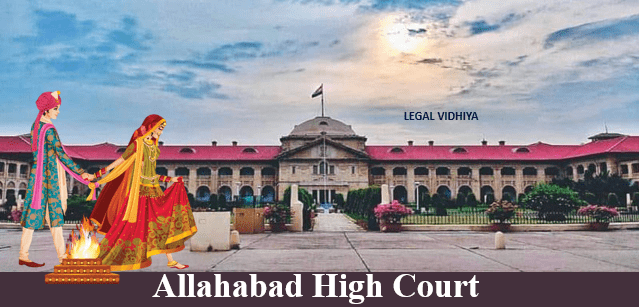
The Allahabad High Court in its recent judgement in the case of Smriti Singh and others. vs State and others held that a Hindu marriage must include ‘Saptapadi’ (the bride and groom take seven rounds around the sacred fire in the center known as ‘saat phere’) to be considered solemnized.
In this case the couple had got married in the year 2017 but eventually drifted away from each other. The aggrieved wife later lodged a first information report (FIR) stating her in-laws had harassed her demanding dowry. A chargesheet was then brought against her spouse and her in-laws. The husband had filed a suit in the year 2021 alleging that his wife had tied the knot with another man before their divorce was finalized. The wife, after having received summons from a Magistrate Court, moved the High Court to strike down the summons. The applicant or wife vehemently denied the claims made by the husband, who yet insisted that he had documentation or proof of the second marriage ceremony.
The Court after reviewing the records provided by the husband as evidence observed that there was no legit proof of a ceremony taking place to officially recognize the presumed second marriage.
The Court believed that the second marriage needed to have been held with suitable rituals and in an appropriate manner in order to establish an offence of bigamy under section 494 of the Indian Penal Code (IPC). It was further noted by the bench that the complaints which were made pursuant to sections 200 and 202 Code of Criminal Procedure (Cr.P.C) contained no allegations with regards to ‘Saptapadi’ under section 7(2) of the Hindu Marriage Act (HMA), 1955.
In granting Smriti Singh’s petition, the wife, the Court opined that it is firmly established fact that the term “solemnize” refers to celebrating a marriage “with appropriate rituals and in suitable form. The marriage cannot be referred to as “solemnised” unless it was carried out with appropriate ceremonies and adequate form. A marriage is not performed according to the law applicable to the parties to the marriage, it will not be considered a lawful marriage. According to Hindu law, the “Saptapadi” ritual is one of the requirements for a legal marriage, but in the current instance, there is no such proof.
Thus, the Court gave its judgement in favor of the petitioner as evidence regarding the performance of saptapadi to conclude a marriage solemnized were absent and called it a criminal prosecution by the husband against the wife with an ulterior purpose.
Written by: Divyani Newar, College name: NEF Law College, 5th Semester, 3 Year LL.B, An intern under Legal Vidhiya




0 Comments